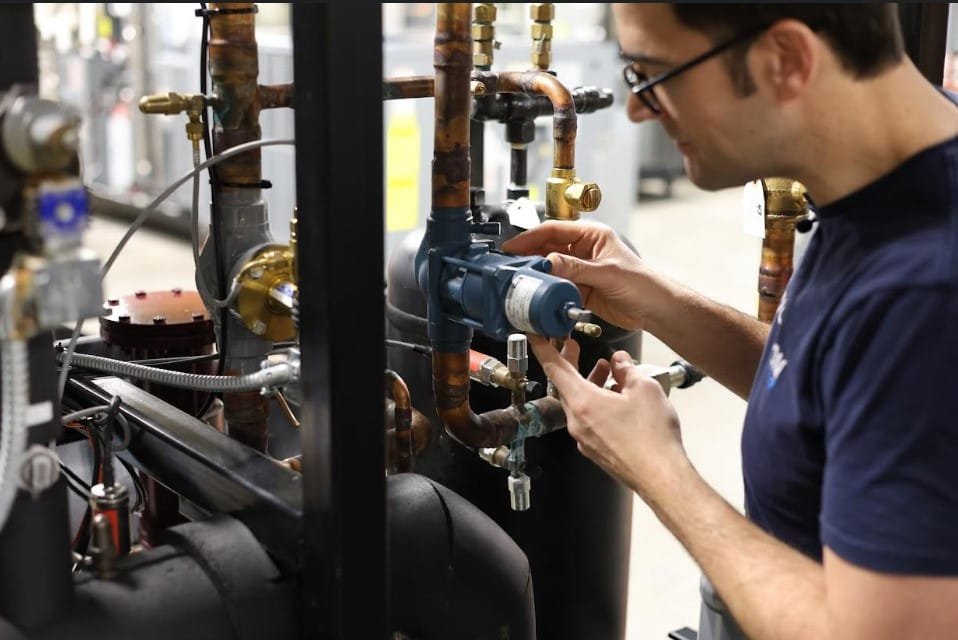Embarking on refrigeration training marks the beginning of a journey into a field that is critical to our everyday life yet often goes unnoticed. Refrigeration systems are the backbone of industries ranging from food preservation to pharmaceuticals, demanding skilled professionals to ensure their efficient operation. Through understanding the complexities of metering devices, system troubleshooting, and maintenance, you position yourself at the forefront of technological advancements, ready to tackle challenges with innovative solutions.
At the core of commercial refrigeration training is a deep dive into the electrical systems that power refrigeration, emphasizing the importance of safety and precision in every task undertaken. This training goes beyond the basics, equipping you with the knowledge to design and implement systems that meet the evolving needs of the industry. With technology advancing at a rapid pace, mastering the process of refrigeration and air conditioning becomes not just beneficial but essential for anyone looking to make a significant impact.
The role of a seasoned technician extends to understanding the intricacies of the piping system, ensuring that every component functions harmoniously within the larger framework of the cooling technology. The Refrigeration Mentor stands as your guide through this intricate landscape, providing in-person mentoring, online courses, and video training tailored to bridge the gap between theoretical knowledge and practical application. This holistic approach ensures a comprehensive grasp of refrigeration principles, setting a solid foundation for your career advancement.
Maintenance and troubleshooting form the backbone of effective refrigeration systems management, highlighting the importance of a meticulous and proactive approach. Through detailed exploration of these areas, you gain not just the skills to maintain system efficiency but also the ability to anticipate potential issues before they escalate. This foresight is invaluable in an industry where downtime can have significant repercussions.
As you embark on this educational journey with The Refrigeration Mentor, remember that you are not just learning to maintain and repair systems; you are stepping into a role that is crucial for the sustainability and advancement of cooling technologies. This training empowers you to make a tangible difference in the world, ensuring the longevity and efficiency of systems that our modern society relies on.
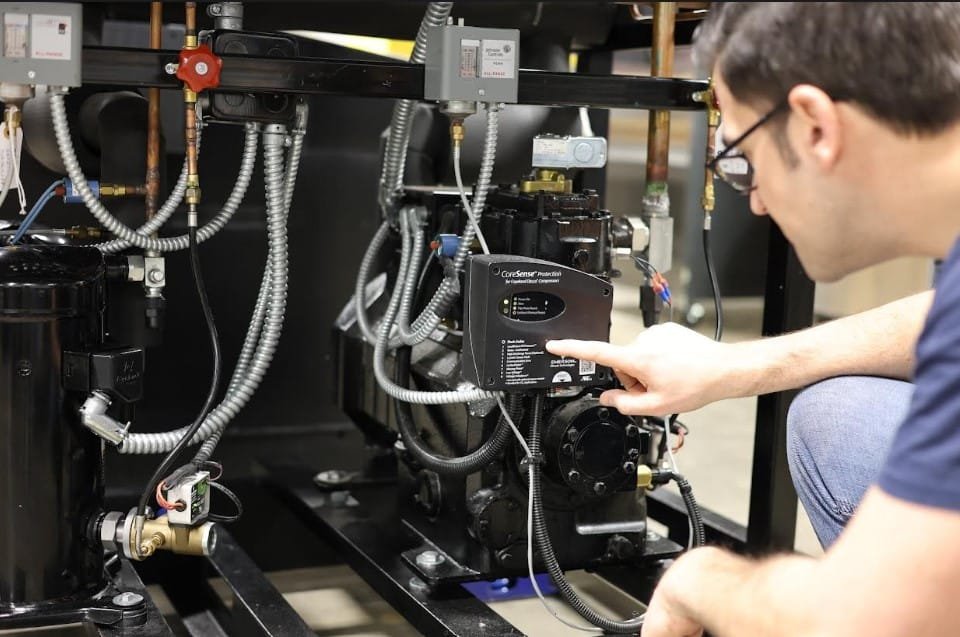
Diving Into Refrigeration Training: What to Expect
Expect a comprehensive curriculum that covers everything from the basics of refrigeration systems to advanced system troubleshooting techniques. Your training will encompass the critical components of refrigeration, including metering devices and the pivotal role of the piping system. Emphasis on safety, understanding technology’s role in the process, and the importance of regular maintenance and proficient handling of electrical systems will prepare you for real-world challenges. With systems constantly evolving, this training is designed to equip you with the skills necessary to excel in today’s demanding environment.
A Comprehensive Overview of Refrigeration and Air Conditioning
The HVACR industry stands as a dynamic field, with refrigeration and air conditioning at its core. This overview will introduce you to the vast landscape of cooling technologies, highlighting the importance of refrigeration systems in maintaining the quality of life and industry standards. As environmental concerns rise and technologies advance, understanding the full spectrum of HVACR becomes crucial for professionals aiming to make a significant impact in the field.
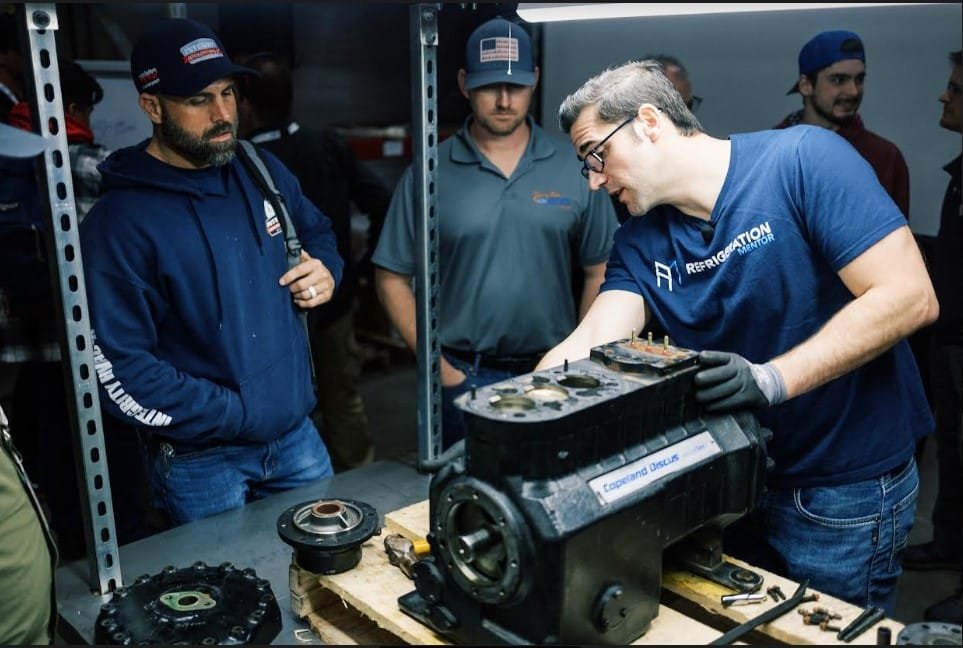
Understanding the Basics: The Refrigeration Cycle
The refrigeration cycle is a fundamental concept that every aspiring HVAC technician must grasp. It is a continuous process that includes evaporation, compression, condensation, and expansion. This cycle is critical for transferring heat from an enclosed space to the external environment, thus facilitating cooling. Refrigeration installation techniques and principles form the bedrock of efficient system design, demanding precision and a deep understanding from every technician.
As you delve into the intricacies of this cycle, you’ll learn how various components work synergistically to achieve desired temperatures efficiently. The process of refrigeration is not just about cooling but involves a delicate balance of physics, thermodynamics, and environmental considerations. HVAC technicians are the custodians of this balance, ensuring systems operate optimally while minimizing environmental impact.
The Refrigeration Mentor’s training programs emphasize hands-on learning, allowing you to apply theoretical knowledge in practical scenarios. This approach ensures that you not only understand the refrigeration cycle but can also implement it effectively in real-world settings. Such comprehensive training prepares you for a successful career in the ever-evolving field of refrigeration and air conditioning.
The Core Components of Refrigeration Systems
Understanding the core components of refrigeration systems is crucial for any seasoned technician. This segment dives into the heart of refrigeration principles, exploring how compressors, evaporators, condensers, and distribution systems work together to facilitate the cooling process. These components are the pillars of any refrigeration system, and mastering their function and interrelation is essential for effective system design and troubleshooting. Knowledge of these fundamentals is what sets apart proficient technicians in the industry.
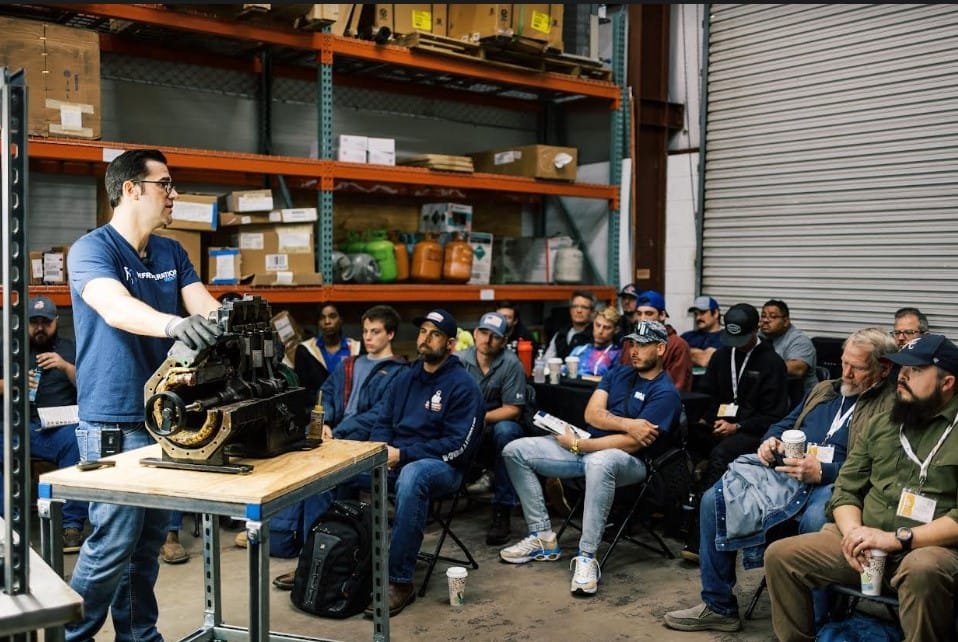
Compressors, Evaporators, and Condensers Unveiled
Compressors are often referred to as the heart of the refrigeration system, pumping refrigerant throughout the system. They play a critical role in the refrigeration cycle, compressing the refrigerant vapor and propelling it into the condenser. Understanding the mechanics and maintenance of compressors is key to ensuring the longevity and efficiency of refrigeration systems.
Evaporators are where the actual cooling effect takes place. As the refrigerant absorbs heat from the environment, it evaporates, thus removing heat and cooling the area. This segment of the training focuses on the design, operation, and troubleshooting of evaporators, equipping you with the skills to enhance system efficiency.
Condensers release absorbed heat into the external environment, completing the refrigeration cycle. The training will cover various types of condensers, their applications, and maintenance practices. By understanding the role and function of condensers, you ensure the refrigeration system operates effectively, maintaining the desired temperature with optimal energy consumption.
Advanced Refrigeration Topics
Delving deeper into the field, advanced refrigeration topics cover the nuanced and complex aspects that seasoned technicians must navigate. This includes an exploration of cutting-edge refrigeration principles and the latest in distribution systems technology. Understanding these advanced concepts is crucial for technicians aiming to stay at the forefront of the industry, ready to tackle the challenges of modern refrigeration demands.
Heat Pump Fundamentals and Applications
Heat pumps represent a pivotal technology in modern refrigeration and HVAC systems, offering both heating and cooling capabilities. This section of the training dives into the principles behind heat pump operation, including the various types of heat pumps and their applications. Understanding how heat pumps function within split systems is crucial for technicians aiming to offer versatile climate control solutions.
The installation, maintenance, and troubleshooting of heat pumps are covered extensively, ensuring you are well-equipped to handle these systems in residential and commercial settings. With an emphasis on efficiency and environmental impact, heat pump technology is presented as a sustainable option in the realm of cooling and heating.
By mastering the fundamentals and applications of heat pumps, you set yourself apart as a knowledgeable technician capable of leveraging this technology to meet the growing demand for energy-efficient climate control solutions. The training provided by The Refrigeration Mentor ensures that you are prepared to implement and maintain these systems effectively, contributing to a more sustainable future.
Key Elements of Effective Refrigeration Training
Effective refrigeration training is rooted in a comprehensive understanding of refrigeration systems, encompassing everything from metering devices to the intricacies of system troubleshooting. Safety is paramount, ensuring all processes are conducted with the utmost caution to prevent accidents and system failures. This training emphasizes the importance of a methodical approach, equipping you with the knowledge and skills to maintain systems efficiently and respond to issues with confidence. By focusing on these key elements, you lay the groundwork for a successful career in refrigeration.
Refrigerants & Refrigerant Oils: What You Need to Know
Refrigerants are the lifeblood of any refrigeration system, and understanding their properties, applications, and environmental impact is crucial. This segment delves into the types of refrigerants commonly used, highlighting the shift towards more eco-friendly options to comply with global regulations. Refrigerant oils, essential for the proper lubrication and operation of compressors, are also covered, underscoring the importance of selecting the right oil for each system.
The training explores the critical role of refrigerants and oils in the efficiency and longevity of refrigeration systems. You’ll learn how to handle these substances safely, minimizing the risk of leaks and ensuring systems are charged correctly. This knowledge is indispensable for technicians aiming to excel in the refrigeration field.
With environmental regulations becoming increasingly stringent, staying informed about the latest in refrigerant technology and practices is essential. The Refrigeration Mentor’s comprehensive training ensures you are well-prepared to navigate the complexities of refrigerants and refrigerant oils, positioning you as a forward-thinking technician in the ever-evolving refrigeration industry.
Mastering Metering Devices for Efficiency
Mastering the use of metering devices in refrigeration systems is crucial for optimizing efficiency and performance. These components are responsible for regulating the flow of refrigerant throughout the system, ensuring that it matches the cooling load demand. A deep understanding of how these devices operate allows you to fine-tune systems to run more smoothly, reducing energy consumption and operational costs. This knowledge is fundamental, not only for those new to the field but also for experienced professionals looking to sharpen their skills.
By engaging in focused training on metering devices, you’ll learn about different types, including thermostatic expansion valves and electronic expansion valves, and how to select the right one for specific applications. Training will cover the principles of superheat and subcooling, which are essential for correctly setting up and diagnosing metering devices. This insight is invaluable when striving to enhance system efficiency and reliability.
Moreover, mastering metering devices through dedicated training enables you to contribute to the sustainability efforts of the refrigeration industry. By ensuring systems are operating at peak efficiency, you’re directly reducing the energy footprint of cooling technologies. This aspect of refrigeration training not only benefits your career growth but also aligns with global efforts to minimize energy consumption in cooling solutions.
The Significance of Piping and Accessories in Refrigeration
The design and installation of piping and accessories in refrigeration systems are pivotal for efficient operation and longevity. Properly selected and installed piping minimizes the risk of refrigerant leakage, ensures optimal flow rates, and reduces pressure drops, all of which contribute to the overall efficiency of the system. Training in this area equips you with the knowledge to make informed decisions on materials, sizing, and layout, which are fundamental for the success of any refrigeration project.
Accessories such as filters, driers, and sight glasses play significant roles in the health of refrigeration systems. Understanding their importance, functionality, and proper placement within the system is essential for maintaining system purity, moisture control, and monitoring refrigerant state. This level of comprehension is critical for preventing system failures and ensuring reliable operation, topics that are thoroughly covered in comprehensive refrigeration training programs.
Furthermore, embracing advanced training in piping and accessories empowers you to innovate and implement best practices in refrigeration design and maintenance. This knowledge is not only a testament to your commitment to excellence but also positions you as a key player in advancing the efficiency and sustainability of refrigeration technologies. As the industry evolves, so too does the demand for skilled professionals who can navigate the complexities of modern refrigeration systems.
Embracing Modern Control Systems for Optimal Performance
Modern control systems are at the heart of maximizing the performance and efficiency of refrigeration systems. These systems offer unparalleled precision in monitoring and adjusting the refrigeration cycle, ensuring that operation parameters are maintained within optimal ranges. Training in the use of these modern control technologies is essential for anyone looking to excel in the refrigeration field. It provides the tools needed to leverage data analytics and automation, enhancing system reliability and performance.
Through specialized training, you’ll gain insights into the latest developments in control system technology, including programmable logic controllers (PLC) and building management systems (BMS) and other types of instrumentation. These systems allow for real-time instrument monitoring and adjustments, which can significantly reduce energy consumption and improve the lifespan of refrigeration equipment. Understanding how to implement and manage these systems is crucial for staying competitive in a rapidly advancing technological landscape.
Moreover, embracing modern control systems through advanced training demonstrates a commitment to innovation and efficiency in refrigeration. It equips you with the skills to design, implement, and troubleshoot sophisticated control solutions, making you an invaluable asset to any organization. This expertise not only enhances your career prospects but also contributes to the broader goal of creating more sustainable and efficient cooling technologies.
Hands-On Experience: The Heart of Refrigeration Training
Hands-on experience is the cornerstone of effective refrigeration training, providing the practical skills and confidence needed to excel in the field. Engaging in real-world tasks under the guidance of experienced mentors allows you to apply theoretical knowledge to practical situations, bridging the gap between learning and doing. This approach ensures that you are well-prepared to handle the complexities of refrigeration systems, from installation to maintenance and troubleshooting.
Technical colleges and specialized training centers offer lab exercises and workshops that simulate actual refrigeration scenarios. These hands-on sessions cover a wide range of skills, from basic refrigeration principles to advanced diagnostics and repair techniques. Working directly with the equipment gives you a deep understanding of how different components interact within the system, an insight that is invaluable for both novice and experienced technicians alike.
The impact of this practical training is profound, enhancing your ability to diagnose issues quickly and accurately, perform efficient repairs, and implement system optimizations that improve performance and energy efficiency. Hands-on experience not only solidifies your understanding of refrigeration technology but also significantly boosts your confidence and competence on the job. This experiential learning is a critical element of a comprehensive refrigeration training program, setting the foundation for a successful career in the industry.
Engaging in Hands-On Lab Exercises
Engaging in hands-on lab exercises is a pivotal aspect of mastering refrigeration technology. These exercises provide a unique opportunity to work directly with the tools and equipment you will encounter in the field, under the supervision of seasoned professionals. Whether it’s assembling and disassembling components, conducting system diagnostics, or troubleshooting common issues, lab exercises offer a practical learning experience that is essential for developing technical proficiency.
During these sessions, you’ll navigate through various refrigeration scenarios, from simple refrigeration cycles to complex commercial systems, gaining valuable insights into their operation and maintenance. This hands-on approach allows you to internalize refrigeration principles and apply them effectively in real-world situations. It’s an invaluable component of refrigeration training, ensuring that you acquire the skills necessary for a successful career in the HVAC industry.
Furthermore, these lab exercises foster a deeper understanding of system design and function, enabling you to troubleshoot and optimize refrigeration systems more effectively. By applying theoretical knowledge in a practical setting, you solidify your learning and enhance your problem-solving capabilities. This hands-on experience is crucial for anyone looking to excel as an HVAC technician, providing a strong foundation for both immediate job performance and long-term career growth.
Troubleshooting: From Basics to Advanced Diagnostics
Troubleshooting is an integral skill in the refrigeration and HVAC fields, requiring a blend of knowledge, intuition, and practical experience. Training in HVACR troubleshooting begins with understanding the basics of refrigeration installations and expands into advanced diagnostic techniques. This progression equips you with the ability to quickly identify and resolve issues, minimizing downtime and ensuring systems operate at peak efficiency. It’s a skill that distinguishes proficient technicians from their peers, highlighting the importance of comprehensive training in this area.
Advanced diagnostic training covers a wide array of troubleshooting scenarios, from electrical malfunctions to mechanical failures and system inefficiencies. HVAC technicians learn to interpret symptoms and trace them back to their root causes, using a systematic approach to problem-solving. This expertise is crucial for maintaining the reliability and performance of modern refrigeration systems, which are increasingly complex and integrated with digital controls.
Moreover, the ability to troubleshoot effectively enhances your value as a technician, opening up opportunities for career advancement and specialization. It demonstrates a high level of competence and confidence in your skills, traits that are highly sought after in the refrigeration industry. Whether you’re working on small residential systems or large commercial installations, advanced troubleshooting skills are essential for ensuring customer satisfaction and operational excellence.
The Impact of Practical Training on Skill Development
The impact of practical training on skill development in the refrigeration industry cannot be overstated. A refrigeration training program that includes hands-on lab exercises and real-world troubleshooting offers a comprehensive learning experience that is essential for mastering the complexities of the field. This approach to training ensures that participants not only understand refrigeration principles but can also apply them effectively in commercial refrigeration settings. It’s the bridge between theoretical knowledge and practical application, crucial for anyone looking to excel in this technical discipline.
Engaging in programs that offer hands-on experience with heat pumps, for instance, prepares technicians for a future where energy efficiency and environmental sustainability are paramount. This type of practical training enhances problem-solving skills, enabling technicians to design, install, and maintain systems that meet the highest standards of performance and reliability. The knowledge and skills gained through such training are invaluable assets in an industry that is continually evolving.
Furthermore, commercial refrigeration training programs are not just about acquiring technical skills; they also emphasize the importance of health and safety, and certification preparation. These aspects of training ensure that maintenance technicians are well-rounded professionals who can work safely and effectively, complying with industry regulations and standards. In essence, practical training plays a pivotal role in skill development, opening up a world of opportunities for those committed to their professional growth in the refrigeration industry.
Who Will Benefit the Most from Refrigeration Training?
Refrigeration training from Refrigeration Mentor is designed to benefit a wide range of individuals, from novices just entering the field to seasoned maintenance technicians seeking to enhance their skill set. For those new to the industry, training provides a solid foundation in refrigeration principles, equipping them with the knowledge and skills necessary to begin a successful career. Experienced technicians, on the other hand, can benefit from advanced training that covers the latest technologies and troubleshooting techniques, ensuring they stay at the forefront of the field.
Maintenance technicians, in particular, will find refrigeration training invaluable for career advancement. The comprehensive coverage of topics from basic refrigeration cycle to complex system diagnostics ensures that technicians are well-prepared to tackle any challenge. Additionally, training programs often include certification preparation, which can be crucial for technicians looking to validate their skills and knowledge in a competitive job market.
Moreover, training in refrigeration is not just about technical skills; it also covers critical aspects of health and safety, ensuring that technicians can perform their duties safely and effectively. This focus on safety is essential for protecting both the technician and the environment, making refrigeration training a key investment for anyone serious about their career in this dynamic field. Whether you’re looking to enter the industry or aiming to solidify your expertise, refrigeration training offers the tools and knowledge needed to succeed.
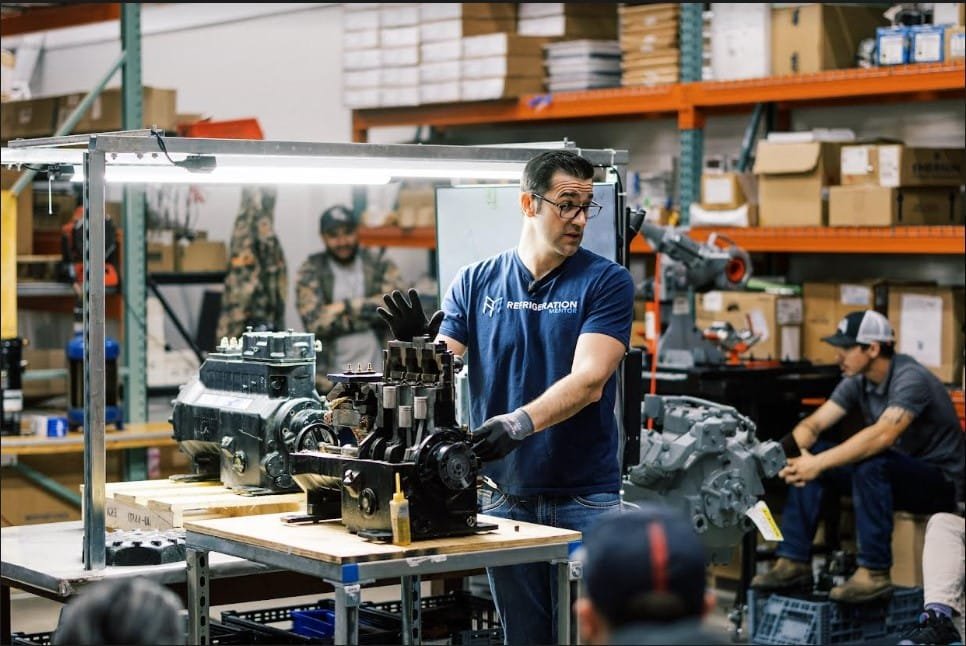
Target Audience: From Novices to Seasoned Professionals
Whether you’re just stepping into the world of refrigeration or you’ve been navigating the complexities of cooling systems for years, refrigeration training programs are designed to enhance your skills and knowledge. For novices, these programs lay a solid foundation in understanding refrigeration principles, equipment, and safety protocols. Seasoned professionals will find advanced topics and the latest industry trends that can propel their careers forward, ensuring they remain at the forefront of technology and regulatory compliance.
The beauty of a comprehensive refrigeration training program lies in its ability to cater to a wide range of learning needs. From the basics of the refrigeration cycle to the intricacies of commercial refrigeration training, there’s something for everyone. Such training is not just about acquiring technical knowledge; it’s about becoming a problem-solver, a critical thinker, and a valuable asset in the fast-paced HVAC/R industry.
Moreover, for those seeking to specialize, advanced courses in areas like heat pump technologies or low GWP refrigerants offer the chance to become experts in niche segments. This diversity ensures that regardless of where you stand in your career journey, there is an opportunity to grow, learn, and advance.
Expanding Opportunities: Who Should Consider This Training
Refrigeration training is not just for technicians. It’s a valuable resource for a variety of professionals within the HVAC/R industry, including engineers, project managers, sales associates, and even educators looking to stay updated on the latest technologies and methodologies. Individuals in roles related to facility management, especially those overseeing large commercial or industrial properties, can greatly benefit from understanding the principles and practices of refrigeration systems.
Entrepreneurs aiming to venture into the refrigeration business or expand their current services will find that training programs equip them with the knowledge needed to make informed decisions and manage their operations effectively. Additionally, safety officers and quality assurance personnel can gain insights into refrigeration standards and safety practices, helping them to implement robust safety protocols within their organizations.
Furthermore, vocational schools and community colleges offering HVAC/R programs can leverage advanced refrigeration training to enhance their curriculum and provide students with a competitive edge in the job market. By embracing such training, educators not only enrich their own technical skills but also ensure their students are well-prepared for the challenges of the industry.
Why Refrigeration Training Is Essential
Refrigeration training is pivotal in ensuring the efficiency, reliability, and safety of cooling systems across various sectors. Understanding how to properly operate metering devices, perform system troubleshooting, and adhere to safety standards can significantly reduce the risk of costly breakdowns and accidents, thereby enhancing system longevity and performance. This training is crucial for maintaining the high-quality standards expected in commercial and industrial settings.
With the constant evolution of refrigeration technologies, professionals must stay abreast of the latest developments to ensure compliance with environmental regulations and to optimize system performance. Training in refrigeration not only equips individuals with the technical skills required for installation and repair but also instills a deep understanding of the principles underlying efficient refrigeration systems, leading to more sustainable practices.
Moreover, as regulations around refrigerants continue to tighten, and the industry shifts towards more eco-friendly solutions, the knowledge gained from refrigeration training becomes indispensable. Professionals who are well-versed in the latest refrigeration techniques, including the safe handling of refrigerants and the implementation of energy-efficient systems, are in high demand. This makes refrigeration training an essential step for anyone looking to secure a future in the HVAC/R industry.
Bridging the Gap Between Theory and Practice
One of the most significant benefits of refrigeration training is its ability to bridge the gap between theoretical knowledge and practical application. While theoretical understanding forms the backbone of any technical profession, the real-world skills acquired through hands-on experience are invaluable. Training programs that offer a blend of classroom learning and practical labs ensure that participants can apply what they’ve learned in a controlled, yet realistic environment.
This approach not only solidifies one’s understanding of complex refrigeration systems but also builds confidence in troubleshooting and repair. By simulating real-world scenarios, trainees can navigate the challenges they might face in the field, under the guidance of experienced professionals. This comprehensive approach to learning ensures that graduates of refrigeration training programs are well-equipped to handle the demands of their roles from day one.
Furthermore, the opportunity to work with a variety of equipment and tools during training prepares individuals for a wide range of situations they may encounter in their careers. Whether it’s commercial cooling systems or specialized refrigeration technologies, hands-on training ensures that participants are versatile, adaptive, and ready to contribute effectively to their workplaces.
Staying Updated: The Importance of Continuous Learning in Refrigeration
In an industry as dynamic as refrigeration, continuous learning is not just beneficial; it’s necessary. For service technicians, keeping up with technological advancements, new regulations, and best practices is crucial for providing high-quality service and installation. Refrigeration training programs offer the latest insights and technical skills required to navigate the evolving landscape of cooling technologies.
Moreover, the knowledge and skills acquired through ongoing education help technicians to identify opportunities for efficiency improvements, ensuring that systems are not only compliant with current standards but are also operating at optimal performance levels. This commitment to excellence and innovation can significantly enhance a technician’s reputation and career prospects.
Additionally, continuous learning fosters a culture of safety, quality, and responsibility. By staying informed about the latest trends and techniques in refrigeration, professionals can lead the way in adopting sustainable practices, reducing environmental impact, and ensuring the safety of both personnel and customers. This dedication to professional development and industry best practices underscores the critical role that continuous learning plays in the success of both individuals and the broader HVAC/R community.
Selecting the Right Training Program for You
Choosing the right refrigeration training program is a vital step in advancing your career in the HVAC/R industry. Factors such as program content, delivery method, and accreditation should be considered to ensure the training aligns with your career goals and learning preferences. Whether you prefer the flexibility of online courses or the hands-on experience of in-person training, there are programs tailored to meet diverse needs and schedules.
Additionally, the reputation and expertise of the training provider are crucial. Programs offered by experienced professionals, such as The Refrigeration Mentor, ensure that you’re learning from experts who are not only knowledgeable about current technologies but also understand the challenges faced by technicians in the field. This insight can be invaluable in preparing you for the realities of the job.
Finally, consider the program’s focus areas and how they align with your interests and career aspirations. Whether it’s commercial refrigeration training, specialized courses on low GWP refrigerants, or comprehensive programs covering everything from basics to advanced diagnostics, selecting a program that matches your professional development goals will maximize the benefits of your training investment.
College Credit, Certifications, and Recognition
Earning college credit, certifications, or industry recognition through refrigeration training courses not only validates your expertise but also enhances your professional credibility. Accredited programs that offer the opportunity to earn credits can provide a significant advantage in pursuing further education or advancing within your career. Certifications, especially those recognized industry-wide, such as NATE or RSES, serve as a testament to your skills and knowledge in refrigeration and ventilation, making you a valuable asset to employers.
Navigating Accreditation: NATE and RSES Certified Training Program Highlights
When selecting a refrigeration training program, understanding the significance of accreditation is crucial. Programs certified by respected organizations such as North American Technician Excellence (NATE) or the Refrigeration Service Engineers Society (RSES) are held to high standards, ensuring that the curriculum is comprehensive, up-to-date, and relevant to industry needs. These accreditations are a hallmark of quality and indicate that the program meets the rigorous requirements necessary to prepare you for success in the field.
Additionally, NATE and RSES certified programs often include a focus on safety, one of the most critical aspects of refrigeration work. This emphasis ensures that technicians are well-versed in the latest safety protocols and best practices, reducing the risk of accidents and enhancing overall system reliability. By choosing a program with these certifications, you are positioning yourself for a career that not only prioritizes technical excellence but also personal and public safety.
Finally, the recognition that comes with completing a NATE or RSES certified program can open doors to new opportunities. Whether you’re seeking employment, aiming for a promotion, or looking to specialize in a certain area of refrigeration, the certifications you earn can differentiate you in a competitive job market. Investing in an accredited program is an investment in your future, providing you with the credentials and confidence to excel in your refrigeration career.
Choosing Between Online and Instructor-Led Training Formats
When considering your path in refrigeration training, the choice between online and instructor-led formats is pivotal. Online training offers the flexibility to learn at your own pace and schedule, making it ideal for those balancing work or personal commitments. However, instructor-led training provides a more hands-on approach, allowing direct interaction with experienced professionals and real-time feedback on your learning progress. Both formats cover essential safety training and maintenance training, but the choice ultimately depends on your learning style and professional goals.
Instructor-led training shines in delivering complex concepts through live demonstrations and immediate clarification of doubts. This format fosters a collaborative learning environment, where you can benefit from the experiences and questions of your peers. Additionally, the opportunity for hands-on practice under the guidance of a seasoned expert is invaluable, especially in mastering the intricacies of refrigeration systems.
Meanwhile, online training platforms have made significant strides in offering interactive and immersive learning experiences. Through virtual labs, simulations, and forums, you can engage with the material in a meaningful way. This format is especially beneficial for those seeking to upgrade their skills while managing other responsibilities. Deciding between these formats involves considering your preferred learning environment, access to resources, and the level of interaction you seek with instructors and fellow learners.
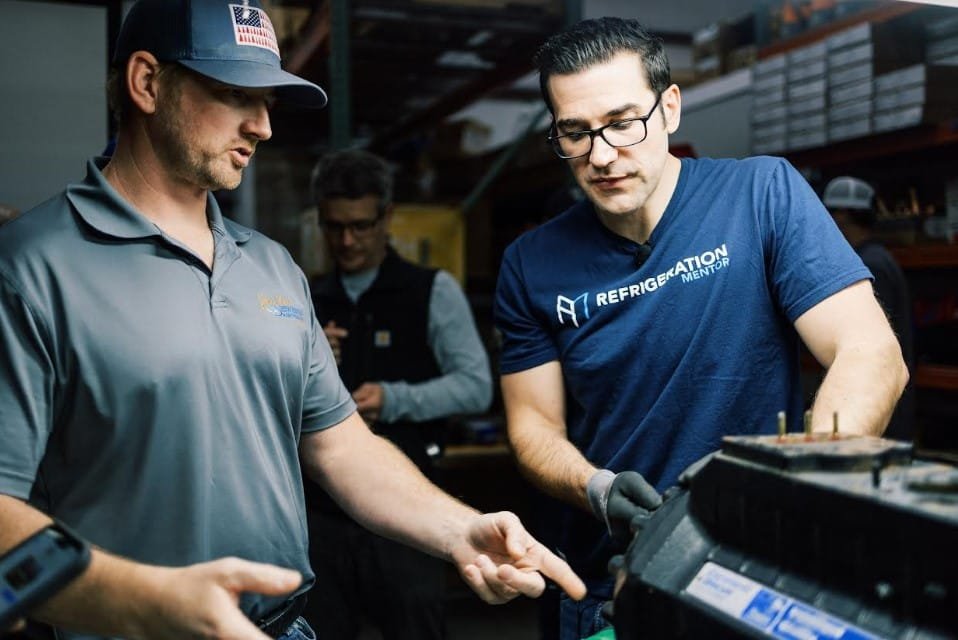
Elevating Your Refrigeration Expertise: Advanced Topics
Advancing your career in refrigeration requires delving into specialized topics that address current industry standards and emerging technologies. By exploring advanced topics such as low GWP/A2L refrigerants, hydrocarbon applications, and the latest in supermarket refrigeration, you position yourself at the forefront of the refrigeration sector. These areas not only enhance your technical skills but also your understanding of environmental compliance, safety regulations, and efficiency optimizations.
Engagement with these advanced topics through a comprehensive program for HVACR technicians and contractors ensures you remain competitive in a rapidly evolving field. This knowledge is crucial for those aiming to lead projects, innovate within their roles, or pursue senior-level positions. With a focus on both theoretical foundations and practical applications, advanced training equips you with the expertise to tackle complex challenges and drive advancements in air conditioning and refrigeration.
The Refrigeration Mentor’s advanced training modules are designed to bridge the gap between standard refrigeration practices and cutting-edge technologies. By earning a certificate of completion in these specialized areas, you validate your skills and commitment to excellence. Whether you’re working on EPA 608 certification or seeking to specialize in a particular niche, advanced training opens new doors to professional growth and recognition.
Exploring Low GWP/A2L Refrigerants for Environmental Compliance
As the refrigeration industry moves towards environmental sustainability, understanding low GWP (Global Warming Potential) and A2L refrigerants becomes essential. These refrigerants are pivotal in reducing the carbon footprint of refrigeration systems, aligning with global efforts to combat climate change. Training in low GWP/A2L refrigerants not only prepares you for compliance with environmental regulations but also positions you as a responsible and forward-thinking professional.
Comprehensive training covers the selection, handling, and application of these refrigerants, ensuring safety and efficiency in their use. As these refrigerants become more prevalent in supermarket refrigeration, air conditioning, and other HVACR applications, your expertise in this area will be increasingly in demand. Understanding the nuances of working with these substances can set you apart in the job market and provide new opportunities for career advancement.
The Refrigeration Mentor’s focused modules on low GWP/A2L refrigerants offer an in-depth look at their properties, benefits, and challenges. This training is crucial for HVACR technicians and contractors aiming to stay ahead in a sector that is rapidly evolving towards greener solutions. As regulations continue to tighten, your ability to work with these refrigerants confidently and competently will be an invaluable asset.
The Future is Now: Hydrocarbon Training Program Overview
The shift towards hydrocarbons as refrigerants marks a significant milestone in the refrigeration industry’s journey towards sustainability. Hydrocarbons, with their low environmental impact and high efficiency, are at the forefront of this transition. The Refrigeration Mentor’s hydrocarbon training program is designed to equip HVACR technicians and contractors with the knowledge and skills necessary to safely handle and implement these refrigerants.
This comprehensive program covers everything from basic properties and safety protocols to advanced application techniques in supermarket refrigeration and air conditioning systems. By completing this training, you will not only enhance your technical capabilities but also demonstrate to employers and clients your commitment to adopting environmentally friendly practices.
Upon earning a certificate of completion, you signal your readiness to engage with the latest refrigeration technologies and environmental standards. This qualification can significantly boost your career, opening up opportunities in sectors that are increasingly prioritizing green initiatives. The Refrigeration Mentor’s hydrocarbon training program is your gateway to becoming a leader in the future of refrigeration.
The Journey Begins: Registering for Your Refrigeration Training
Embarking on your refrigeration training journey is a step towards securing a promising career in the HVACR industry. The process begins with selecting the right training program that aligns with your career goals and learning preferences. Whether you’re a novice looking to break into the field or an experienced professional seeking to update your skills, The Refrigeration Mentor offers a range of programs tailored to your needs.
Registration is streamlined and user-friendly, designed to get you started without delay. You’ll choose from a variety of topics, including fundamental refrigeration principles, advanced refrigerant technologies, and specialized areas like metering devices and supermarket refrigeration systems. Each program is structured to provide comprehensive knowledge and hands-on experience, ensuring you’re well-prepared for the challenges of the refrigeration industry.
As you proceed with your registration, consider the format that best suits your learning style and logistical requirements. The Refrigeration Mentor offers both online training and instructor-led sessions, giving you the flexibility to tailor your education to your personal and professional obligations. With expert instructors, cutting-edge content, and a commitment to excellence, your journey in refrigeration training is poised for success.
Finding the Perfect Training Location and Date
Choosing the right training location and date is crucial for maximizing the benefits of your refrigeration training. The Refrigeration Mentor offers programs across the United States, providing ample opportunities to find a session that fits your geographic and scheduling needs. Online training is also available, offering a flexible alternative that allows you to learn from anywhere at any time.
When selecting a training session, consider the proximity to your home or workplace, the availability of accommodations if necessary, and the timing that best fits your schedule. Early registration is advised to secure your spot in the desired location and date, as popular sessions tend to fill up quickly. The Refrigeration Mentor’s website provides comprehensive information on upcoming sessions, making it easy to plan your training in advance.
For those opting for online training, the convenience of accessing your course from any location in the United States adds a layer of flexibility to your learning experience. This format is ideal for individuals with tight schedules or those living in areas without nearby instructor-led options. Regardless of your choice, The Refrigeration Mentor ensures high-quality training that meets your educational and professional needs.
Investment and Billing Information: Maximizing Your Training Budget
Investing in your refrigeration training is an investment in your future. The Refrigeration Mentor understands this and is committed to providing value through high-quality, cost-effective training options. Detailed investment and billing information is readily available, outlining the costs associated with each program and the payment methods accepted. This transparency helps you plan and budget for your training effectively.
Various training programs offer different pricing structures, including options for early registration discounts, group rates, and packages that bundle multiple courses at a reduced cost. For professionals and organizations in the United States, these flexible payment options ensure that training is accessible and affordable, regardless of your budget size.
To further maximize your training investment, consider the long-term benefits of the skills and certifications you will acquire. These credentials can open doors to higher-paying positions, more significant opportunities, and the potential for career advancement. By carefully selecting the right program and taking advantage of available financial options, you can ensure that your investment in refrigeration training pays off in the years to come.
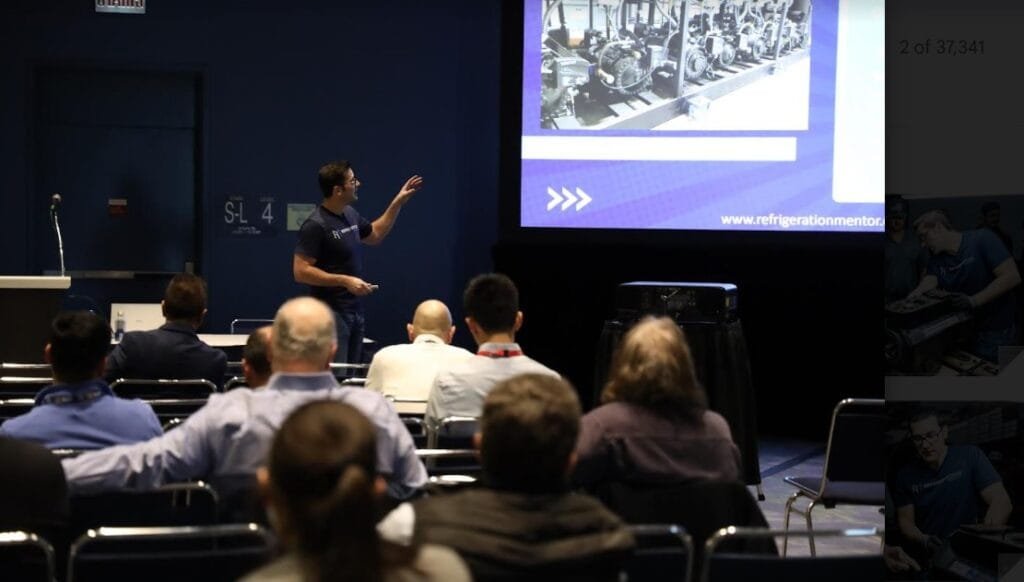
Cooling Down: Final Thoughts on Refrigeration Training
As the refrigeration industry continues to evolve, staying ahead through comprehensive training has never been more critical. The Refrigeration Mentor is dedicated to empowering HVACR professionals with the knowledge, skills, and certifications needed to excel in this dynamic field. Whether you’re just starting out or looking to specialize further, the right training can significantly impact your career trajectory.
The blend of theoretical knowledge and hands-on experience offered through various training formats ensures that you’re well-equipped to tackle the challenges of modern refrigeration systems. From fundamental principles to advanced technologies and environmental compliance, the breadth of topics covered prepares you for success.
In conclusion, embarking on or continuing your journey in refrigeration training is a strategic move towards a rewarding and sustainable career. By choosing The Refrigeration Mentor, you’re not just gaining education; you’re joining a community committed to excellence and innovation in the HVACR industry. The path you take today shapes your professional tomorrow, and with the right training, the future looks exceptionally cool.
How Refrigeration Training Paves the Way for a Sustainable Future
Engaging in comprehensive refrigeration training is not just about enhancing your career; it’s about contributing to a sustainable future. The refrigeration industry is at the forefront of environmental change, adopting new technologies and refrigerants that minimize impact on the planet. By understanding system operation and the safe handling of these new refrigerants, you ensure systems are not only efficient but also environmentally friendly. This knowledge is crucial as the industry moves towards low Global Warming Potential (GWP) refrigerants and seeks to reduce carbon footprints.
Moreover, certification exams and technician certification play a critical role in promoting sustainability. These certifications validate your expertise in the latest refrigeration practices, including the proper installation, maintenance, and repair of modern refrigeration systems. By achieving certification, you’re demonstrating a commitment to upholding the highest standards of environmental responsibility. This not only positions you as a leader in the field but also ensures that you are part of the solution in the global effort to combat climate change.
Finally, the safe handling of refrigerants and system components is a fundamental aspect of refrigeration training that directly contributes to environmental sustainability. Proper handling reduces the risk of leaks and emissions, which are harmful to the ozone layer and contribute to global warming. As you advance in your refrigeration training, you’ll learn the importance of meticulous system maintenance and the role of cutting-edge technologies in promoting energy efficiency. This knowledge is invaluable, empowering you to make informed decisions that help pave the way for a greener, more sustainable future.
